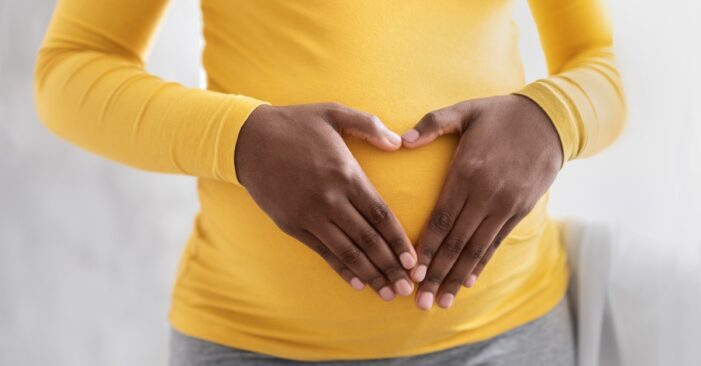By Habiba Katsha, HuffPost UK
The historic statistic that Black women in the UK are five times more likely to die in childbirth than white women, even in the 21st century, is often repeated – but no less shocking each time you hear it.
That these numbers have “improved” marginally – Black women are now four times more likely to die during labour, according to the most recent MBRACE report – only highlights the dire inequality of the situation.
Now, the campaign group Five X More, set up by two Black British mothers in 2019 to address this inequality, has released new research, which finds that racism is part and parcel of the health risks faced by Black mums-to-be.
Black women report both discrimination and a mixed level of maternity care during the antenatal, labour, and postnatal period, according to the Five X More Black Maternity Experiences survey, which is being presented at the Royal College of Obstetricians and Gynaecologists on Tuesday.
One respondent said of her prenatal appointments: “I’d turn up in a tracksuit and be spoken to in a certain (dismissive) way until they learnt I was a lawyer… and they would be more respectful overall in my experience.”
Another said of her labour: “One midwife said that the reason for dilation taking so long for me was ‘probably due to an African pelvis’ – even though I was on pain relief. I was mortified that she actually believed there was such a thing as an African pelvis.”
More than a third (36%) of respondents reported feeling dissatisfied with how their concerns were addressed by healthcare professionals during labour.
View this post on Instagram
Tinuke Awe, co-founder of Five X More, said: “The findings in this report highlight the urgent work needed to ensure that rapid improvements are made because a positive birthing experience is deserved not just by some, but by all.”
Awe said that while previous studies highlighted the “striking disparity” between Black and white women’s experience of maternity, the reasons for that difference have remained unclear, which is what prompted the report.
The group surveyed 1,340 women and birthing people from around the UK, who either identified as Black or of Black mixed heritage and had accessed NHS maternity services while pregnant between 2016 and 2021.
“Despite the stark disparities in maternal outcomes, Black women’s voices and lived experiences have been notably absent from literature to date,” said Awe.
The report was also important, she stressed, as it showed the poorer health outcomes Black women face aren’t always due to socio-economic status.
“A lot of people who have responded back to our study earn above the national average, are degree level educated and married, so it isn’t always about a women’s socio-economic status,” Awe told HuffPost UK,
Instead, it shines a light on the “assumptions, knowledge and attitudes” of health professionals, she said.
In August 2020, HuffPost UK and Black Ballad exposed similarly shocking instances of healthcare racism endangering Black mothers, following a Five x More petition to address the issue, which attracted more than 187,000 signatures and led to a parliamentary debate in April 2021.
“The Five X More campaign wasn’t very well received at all until the Black Lives Matter movement happened,” Awe told reporter Nadine White at the time.
“I’m so happy that we’ve finally been able to raise awareness and get the message out there but it’s a shame it took the televised murder of George Floyd for more people to start having this conversation.”
Of the new research, Awe tells HuffPost UK: “It’s a report that is completely led by Black women and for Black women. We have an all Black expert panel [at the launch] – and we just want to show people this is how it’s done properly.
“We delve into the kind of information given, in order to make informed decisions about our care. We delve into complaints and the standard of care given to Black women, asking them about their lived experiences.
“And at the end of our survey, we actually asked them what they want to see changed in maternity care to help improve their experiences.”
Five X More’s findings also follow the publication on Monday of a year-long investigation by the charity Birthrights, in which more than 300 people gave evidence to a panel chaired by the barrister Shaheen Rahman QC.
The Birthrights report, entitled Systemic Racism, not Broken Bodies, found that racial discrimination in maternity care is harming both Black and Asian women, and women of mixed ethnicity – and highlighted the need for urgent action, including training for health care professionals that focused on diversity.
Women repeatedly reported feeling “unsafe”, being denied pain relief, and facing racial stereotyping about their pain tolerance. Other common experiences that emerged included:
- Healthcare professionals failing to recognise serious medical conditions, such as jaundice in Black babies as “white bodies” were seen as the norm
- Micro-aggressions and assumptions leading to distress and trauma for women of colour during pregnancy and birth
- Reports of women and staff hearing Black women being referred to as “aggressive” or “angry” and Asian women as “princesses” or “precious”
The report exposed further racism, such as staff saying that Black women and babies have “thick, tough skin”, that a ward where South Asian families were being cared for smelled “of curry”, and that Chinese people were “dirty”.
In response to the Birthrights report, a spokesperson for the Department of Health and Social Care told the Guardian that a Maternity Disparities Taskforce set up in February would “level up maternity care for all women, particularly those living in deprived areas or from ethnic minority backgrounds.”
They added: “It will focus on improving access to effective maternity care and care for women trying to conceive and will address factors linked to unacceptable disparities in quality of care, experiences and outcomes.”

